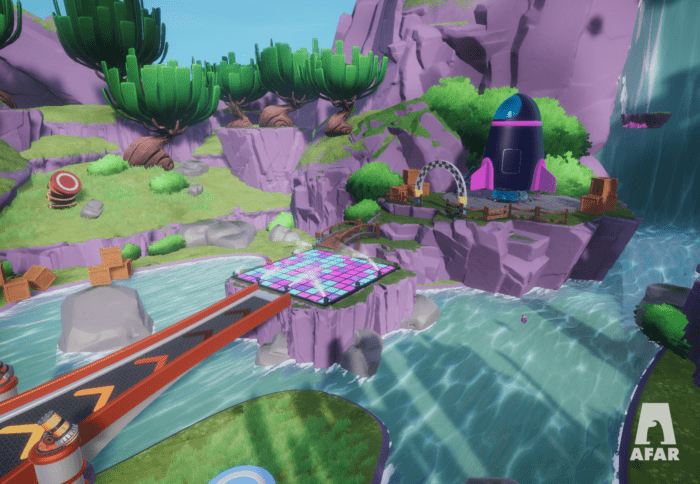Kaya Tilev is a renowned entrepreneur and investor. He is also the founder and CEO of Lava Labs. We had the exciting opportunity of interviewing Kaya about his role at Lava Labs and the future of their upcoming game and metaverse, A Far Away Realm (AFAR).
With companies adopting different approaches towards building Metaverses, we began our conversation by asking Kaya how Lava Labs planned on making the AFAR Metaverse stand out from others:
“With AFAR, we’re focusing on creating games that give people a fun reason to return. Combining a “fun-first” design approach with our unique art enables an engaging environment where people would love to interact.“ Kaya explained.

“Our characters are shorter than humans, separating them from other metaverses with full humanoid characters. On top of that, we’re adding proven yet unique features, like a virtual jukebox and disco that we haven’t seen at scale in any other games.“.
Asked what deeper experiences Lava Labs are looking to provide for their community in the AFAR metaverse, Kaya explained AFAR would incorporate facilities for both blockchain gamers and traditional gamers:
“We think blockchain gamers today are great. Some are investors looking for a return, others are just looking for fun. So, we’re looking to cater to both types of players keen to be in a different and visually unique place..”
Kaya also clarified why using Unity as their game engine was most suitable, despite Unreal Engine being the more common choice amongst Metaverse development companies:
“We’re one of the few ambitious companies using Unity. Unreal is a very sophisticated engine that allows complete customization. There is a massive squeeze on engineers at the moment. Unity offers an “out of the box” approach.“
“Regarding the Metaverse, both engines face the same challenges – dealing with many concurrent people within the same server, handling latency issues, handling cheating, and moderating the servers. All of these challenges are due to the massive scale required of the Metaverse.“

With many tech giants like Meta also working with game engines like Unity, we asked Kaya what other companies will make a major impact in metaverse development in the future:
“Change stems from unlikely sources, and big pivots from publishers like Epic would be more successful. I say this because Epic owns Unreal Engine. With Fortnite, Epic is vertically integrated from the engine to game to their massive player base.“
“Moreover, Fortnite has a good store; it’s visually engaging, and the gameplay is fun. This is where Unity will struggle because they’re not vertically integrated. They don’t own a studio andwill be dependent on others for their success.“
Similarly, many games like Fortnite already have in-game currencies that players can use to buy or sell products. However, the importance of NFTs and crypto in developing an in-game economy for the Metaverse is debated:
“Most games have their in-game currency, but they don’t need crypto NFTs to have a Metaverse. It could be a way to engage and incentivize players to participate in Metaverse-related activities”

The conversation quickly steered towards the subject of decentralization and ownership.
Curious about his plans for the AFAR Metaverse, we touched base on the need for decentralization in gaming:
“I don’t believe that things today are decentralized,“ Kaya explained.
“I think it’s a great marketing word. But I don’t think it’s a reality today. We’re far away from true decentralization.“
“If you start the marketing and hype too early and adopt an aggressive strategy, people will ultimately be disappointed. My background and my team’s background are great differentiating factors because we aim to build and execute on our promises”.

And we couldn’t have put it better ourselves – execution is key, and Lava Labs is well positioned against other industry competitors to execute on its promises:
“There are three components to our strategy. The first component is the IP. It’s a beautiful world, looks good, and has unique characters. “
Second, our team is very experienced in making and shipping games. Most companies will struggle with shipping games especially at scale in an economically viable way. Lets see if SpatialOS can execute the Otherside Bored Ape metaverse in an economically viable way. Frankly, it would be good for the industry if they do so.
”Third, we’re categorically unique in the high-fidelity category. Our graphics look incredible, allowing for more immersive experiences. It ultimately just boils down to being able to handle many players at scale, which we’ve also done in the past. Our CTO, Ed Morley, has helped scale Avakin Life to 250 million downloads.”

To round off the interview, we asked Kaya if they have any future projects in mind for Lava Labs and what the future holds:
“We plan to release more games for Lava Labs and establish strategic brand partnerships. We’ve had many high-level discussions about this, but we’re careful who we partner with. There are brands such as Nike and Tommy Hilfiger that have audiences that are aged from 12-15. That demographic is a great match for us.”
You can visit their website to learn more about Lava Labs and their upcoming metaverse project AFAR.
If you liked this post, make sure to read our best metaverse games list!
If you found this article to be informative, you can explore more current Digital Twin news here exclusives, interviews, and podcasts.













